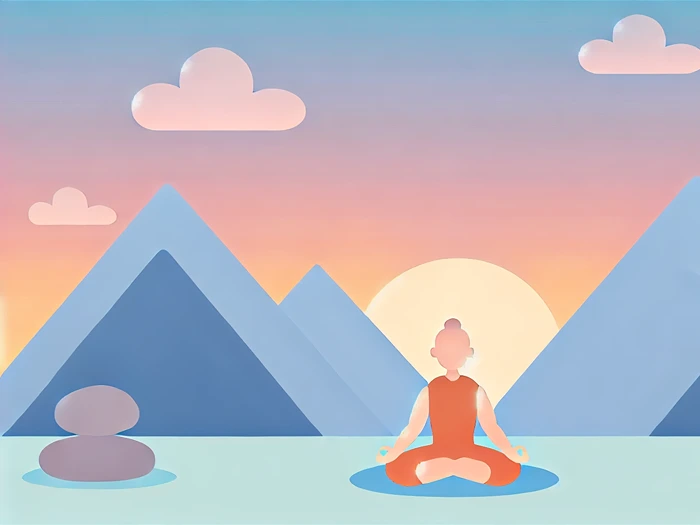
Meditation: The Secret to Inner Peace and Mental Clarity
Meditation has become a cornerstone practice for those seeking inner peace and mental clarity. As our lives become increasingly hectic, finding moments of tranquility and mental focus has never been more crucial. Whether you’re new to meditation or have been practicing for years, understanding its impact on your mental well-being can lead to profound changes in your life. This article will delve into the various aspects of meditation, from its benefits to practical tips for beginners.
What Is Meditation?
Meditation is a practice where an individual uses a technique – such as mindfulness, focusing the mind on a particular object, thought, or activity – to train attention and awareness, and achieve a mentally clear and emotionally calm state. While meditation is often associated with religious traditions, it has been embraced by people worldwide for its numerous mental and physical health benefits.
Helpful Hint:
If you’re new to meditation, start with just five minutes a day. Gradually increase the time as you become more comfortable with the practice.
How Does Meditation Promote Inner Peace?
Inner peace is a state of being mentally and spiritually at peace, with enough knowledge and understanding to keep oneself strong in the face of stress. Meditation plays a crucial role in promoting inner peace by helping individuals detach from the constant chatter of the mind and the external noise of the world. By focusing inward, meditation allows you to reconnect with your core self, fostering a sense of tranquility and balance.
Reducing Stress Through Meditation
One of the primary reasons people turn to meditation is to reduce stress. Stress is an inevitable part of life, but how we manage it can significantly impact our overall well-being. Meditation provides a way to step back from stressful situations and observe them from a calm, centered perspective. This shift in perspective can reduce the intensity of stress and help you respond more effectively.
Stats:
According to the American Psychological Association, regular meditation can reduce stress levels by up to 25%. This reduction in stress can lead to improved mental and physical health.
Enhancing Emotional Stability
Emotional stability is another key benefit of meditation. By regularly practicing meditation, you can develop a greater awareness of your emotions, allowing you to recognize and address negative feelings before they spiral out of control. This heightened emotional awareness can lead to a more balanced and stable emotional state, contributing to your overall inner peace.
How Can Meditation Improve Mental Clarity?
Mental clarity refers to the state of having a clear and focused mind. In a world filled with distractions, achieving mental clarity can be challenging. Meditation is a powerful tool for cutting through the mental clutter, allowing you to focus more effectively on what’s important.
Improving Focus and Concentration
One of the most immediate benefits of meditation is improved focus and concentration. By training your mind to stay present and focused during meditation, you build the mental muscles needed to maintain concentration in everyday tasks. This increased focus can lead to better performance at work, improved learning, and a more fulfilling life overall.

Boosting Creativity and Problem-Solving Skills
Meditation doesn’t just enhance focus; it also boosts creativity and problem-solving skills. By clearing the mind of unnecessary thoughts and distractions, meditation creates the mental space needed for creative thinking and innovative solutions. Whether you’re an artist, writer, or business professional, meditation can help you tap into your creative potential.
Reducing Mental Fatigue
Mental fatigue can be a significant barrier to clarity and productivity. When your mind is tired, even simple tasks can feel overwhelming. Meditation helps to reduce mental fatigue by giving your brain a much-needed break. Regular meditation can lead to sustained mental energy, making it easier to stay sharp and focused throughout the day.
Types of Meditation for Inner Peace and Mental Clarity
There are many different types of meditation, each with its unique approach to achieving inner peace and mental clarity. Here are a few popular methods:
- Mindfulness Meditation: This type of meditation involves focusing on the present moment, accepting it without judgment. It’s particularly effective for reducing stress and increasing self-awareness.
- Transcendental Meditation: This technique uses a mantra or series of words that are repeated silently to promote relaxation and reduce stress.
- Guided Meditation: In this practice, a guide or teacher leads you through the meditation, often using imagery or visualization to help you focus.
- Loving-Kindness Meditation: This meditation focuses on developing feelings of compassion, love, and kindness towards oneself and others.
- Zen Meditation: Originating from Buddhist traditions, Zen meditation emphasizes posture, breathing, and the mind’s interaction with the present moment.
Meditation Techniques at a Glance
| Meditation Technique | Key Benefits | Best For |
|---|---|---|
| Mindfulness Meditation | Enhances awareness, reduces stress | Beginners, those seeking to live in the moment |
| Transcendental Meditation | Deep relaxation, stress reduction | Individuals looking for a structured practice |
| Guided Meditation | Improves focus, aids relaxation | Those who prefer instruction or visualization |
| Loving-Kindness Meditation | Increases compassion, emotional well-being | People seeking to improve relationships with themselves and others |
| Zen Meditation | Promotes discipline, enhances clarity | Those interested in Buddhist practices |
Helpful Hint:
Experiment with different types of meditation to find the one that resonates most with you. What works for someone else might not be the best fit for your needs.
How to Start a Meditation Practice
Starting a meditation practice might seem intimidating, but it’s simpler than you might think. Here are some steps to help you get started:
Setting Up Your Meditation Space
Your environment plays a crucial role in the success of your meditation practice. Choose a quiet, comfortable space where you won’t be disturbed. This could be a corner of a room, a spot in your garden, or even a dedicated meditation room. Make sure the space is clean and free of distractions, and consider adding elements like candles, incense, or soothing music to create a calming atmosphere.
Choosing the Right Time
Finding the right time to meditate is essential for establishing a consistent practice. Some people prefer to meditate first thing in the morning to start their day with a clear mind, while others find that meditating in the evening helps them unwind and relax before bed. Experiment with different times of day to see what works best for you.
Starting with Breathing Exercises
If you’re new to meditation, beginning with simple breathing exercises can be a great way to ease into the practice. Focus on your breath as it moves in and out of your body, and try to let go of any other thoughts or distractions. This focus on breathing helps to center your mind and prepare you for deeper meditation.
Helpful Hint:
If you find it challenging to stay focused during meditation, try counting your breaths. Start with a count of one as you inhale, then two as you exhale, and continue until you reach ten. Then start over again.
Overcoming Common Challenges in Meditation
Meditation is a simple practice, but it can present challenges, especially for beginners. Here are some common obstacles and how to overcome them:
Dealing with Restlessness
Restlessness is one of the most common challenges in meditation. It’s normal for the mind to wander, especially when you’re first starting. The key is not to fight these thoughts but to acknowledge them and gently bring your focus back to your breath or mantra. With practice, this will become easier, and your mind will become more settled.
Managing Expectations
Many beginners expect immediate results from meditation, but like any skill, it takes time to develop. Be patient with yourself, and don’t get discouraged if you don’t experience profound peace or clarity right away. The benefits of meditation are cumulative, and they will become more apparent with regular practice.
Finding the Time
In our busy lives, finding time to meditate can be challenging. However, even a few minutes a day can make a difference. Start small, with just five minutes, and gradually increase the time as you become more comfortable. Remember, the consistency of your practice is more important than the duration.
The journey to inner peace and mental clarity through meditation is a deeply personal one, and it’s important to find a practice that works for you. Whether you’re looking to reduce stress, enhance your focus, or simply find a moment of calm in your day, meditation offers a powerful tool to achieve these goals.
Is Meditation Right for You? Weighing the Pros and Cons
Pros
- Reduces stress and promotes relaxation.
- Improves focus and concentration.
- Enhances emotional stability and self-awareness.
- Accessible and can be practiced anywhere.
- Requires no special equipment or costly investments.
Cons
- Requires time and consistency to see benefits.
- Can be challenging for individuals with a very restless mind.
- May not provide immediate results, leading to frustration.
- Some individuals might find it difficult to sit still for extended periods.
- Initial stages may lead to discomfort or agitation as one adjusts to the practice.
FAQs
Final Thoughts
Meditation is more than just a relaxation technique; it’s a way of life that can bring profound changes to your mental and emotional well-being. By incorporating meditation into your daily routine, you can cultivate a sense of inner peace, enhance your mental clarity, and improve your overall quality of life. The benefits of meditation are well-documented, and with consistent practice, you too can experience these transformative effects.
Additional Resources
- Mindful.org – A comprehensive resource for mindfulness and meditation practices, including articles, guides, and a community for support.
- Headspace – An official website offering guided meditation and mindfulness techniques to help reduce stress and improve focus.
- Mayo Clinic on Meditation – The Mayo Clinic provides an overview of the health benefits of meditation, supported by scientific research.
- Transcendental Meditation (TM) – The official website of Transcendental Meditation, offering detailed information on the practice and its benefits.
- Calm – An official website and app focused on meditation, relaxation, and sleep, offering resources for mental clarity and emotional stability.
